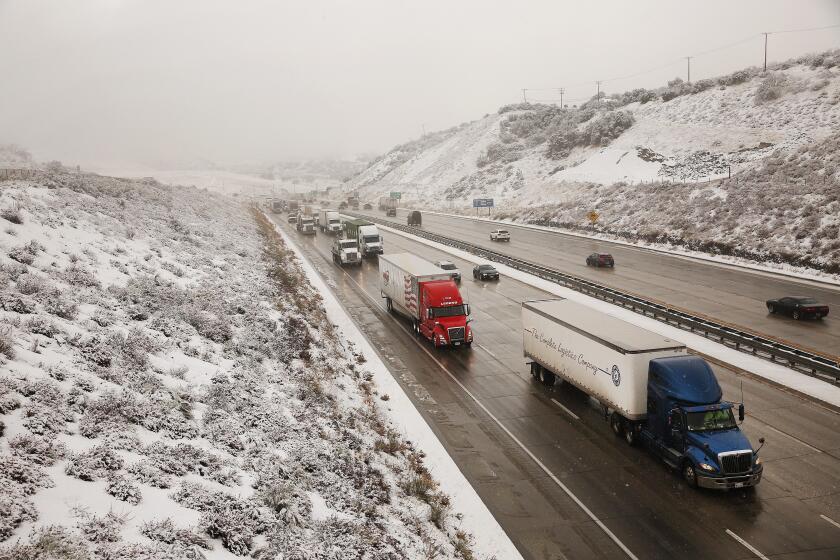Jury Trial Ordered in BKK Dump Fraud Case
The owners of the BKK landfill in West Covina, as well as a South El Monte company and five individuals, face arraignment Monday in Los Angeles Superior Court on charges that they conspired to shortchange the state Department of Transportation in the cleanup of a Lynwood dump.
Defense attorneys claimed a partial victory last week when Los Angeles Municipal Judge Barbara A. Meiers ruled that the overcharge amounts to far less than the $1 million contended by the prosecution. Her ruling, defense attorneys said, in effect reduces the amount involved to $46,000.
But after an 11-week preliminary hearing, Meiers also found enough evidence to try all the defendants on charges of grand theft, forgery, embezzlement, presenting fraudulent claims, diversion of construction funds and conspiracy to commit each of those acts.
List of Defendants
Held for trial were BKK Corp. and two employees who have since retired: Jack Thompson, who managed the company’s landfill in West Covina, and Dean Virden, who was controller. Also named were the contracting firm of Andrew Papac and Sons of South El Monte, owner Andrew (Butch) Papac and his son, Andrew G. Papac, and their business associate, William Paul Dunlap.
Ronald Gastelum, lawyer for BKK Corp., predicted that the company will be vindicated when the case goes to trial. “We’re absolutely convinced that the jury will throw it out,” he said.
The elder Papac, who founded the contracting company in 1944, said he also expects acquittal, but contended that in the meantime, his business and reputation have suffered. “Caltrans has ruined my reputation,” he charged. “Caltrans has destroyed my business.”
Papac obtained a contract from the state Department of Transportation in 1982 to excavate contaminated dirt from the Willco dump in Lynwood to clear a path for the Century Freeway. The charges, filed last February, allege that the contractor obtained a $5-a-ton discount from BKK on dumping fees, that the defendants concealed that information from Caltrans, and as a result, that the contractor received excessive payments from the state.
Found Hazardous
The company won the dirt-removal contract with a bid of $3.9 million, but the contract allowed the price to rise if the material turned out to be hazardous and required special handling. Most of the material was found to be hazardous--contaminated with zinc, copper, chromium and other metals, including lead from paint sludge--and the state was billed for $12 million before Caltrans halted the excavation work in November, 1983.
Prosecutors said the state was overcharged because Caltrans thought Papac and Sons was paying BKK $24 a ton to dump the waste, but BKK lowered its price to $19.
The contractor began hauling waste to the BKK landfill in March, 1983, and was $800,000 behind in payments to the dump, when BKK officials agreed at a meeting in August of that year to cut the dump fee retroactively. Gastelum said that in return for the discount, Papac and Sons made the back payments and agreed to pay on a weekly basis in the future, instead of accumulating a monthly bill.
Attorney Warren Ettinger, who represents BKK in the criminal proceedings, asserted that neither the company nor the two former employees charged in the case profited by the arrangement. Nor, he said, did BKK have any obligation to report the discount to Caltrans. Both Gastelum and Ettinger said BKK was an innocent victim.
Prosecutor’s Argument
But Carmen Trutanich, deputy district attorney, said testimony at the preliminary hearing indicated that BKK employees helped the contractor conceal information from Caltrans about the discount. He said BKK could have been motivated by a desire to obtain as much hazardous waste as possible before authorities restricted the dump to accepting only ordinary household and commercial trash, which carries a lower fee. He noted that authorities were then investigating environmental problems at the dump and that it was closed to hazardous waste in 1984.
Attorney David Arredondo, who represents Papac and Sons and the company’s owner, Andrew Papac, said that firm concedes that it owes some money to Caltrans because of the discount on the dumping fee.
The prosecution contends that the overcharge amounts to $1 million for the 200,000 tons of hazardous waste hauled to BKK. But Arredondo said Judge Meiers agreed that the overcharge applies only to the time when the contract was based on costs incurred, from March through June, 1983, and not to waste that was hauled under a later agreement at a fixed price of $38.50 per ton. Arredondo said the ruling reduces the amount involved to $46,000.
Basis of Arithmetic
Prosecutor Trutanich said Caltrans accepted the fixed-price amount with the understanding that the dump fee was $24 a ton, not $19, which is why he believes that the overcharge amounts to $1 million. But, he said, even though the judge sided with the defense in the interpretation of the contract, that does not diminish the charges against the defendants. In fact, he noted, as new evidence emerged at the preliminary hearing, additional charges were added.
All the defendants face 10 charges, and the Papacs and Dunlap also face a charge of corrupt action in violation of a public contract. In addition, Dunlap faces two counts of tax evasion for failure to file state returns in 1983 and 1984, and his wife, Patricia, faces a misdemeanor charge of failure to file a tax return.
The individual defendants in the cases could be sent to prison for up to five years if convicted. The penalty for the corporations would be fines.
Sacramento Suit
In addition to the criminal case, Caltrans and Papac and Sons are suing each other in Sacramento Superior Court over the cleanup contract.
Papac said the overcharge dispute should have been settled through a final accounting on the contract. He said Caltrans withheld $600,000 in payments during the project, and if he owes Caltrans $46,000, that is much less than the state owes him.
He called the whole case “is strictly a civil matter. Nothing criminal was involved.”
But, he said, the charges have made it impossible for his company to obtain bonding and so it can no longer bid on public projects. As a result, he said, his company, which formerly did $2 million to $3 million worth of projects a year, is nearly out of business.
More to Read
Sign up for Essential California
The most important California stories and recommendations in your inbox every morning.
You may occasionally receive promotional content from the Los Angeles Times.










